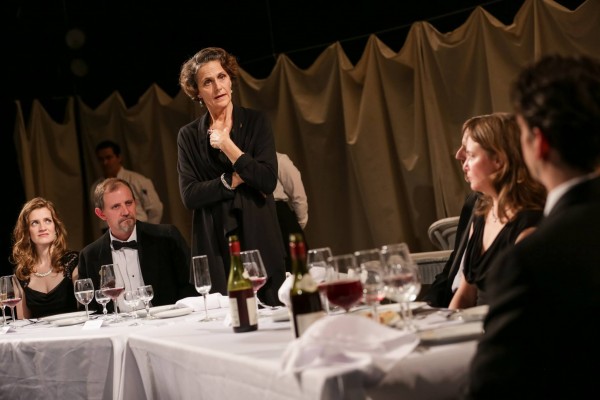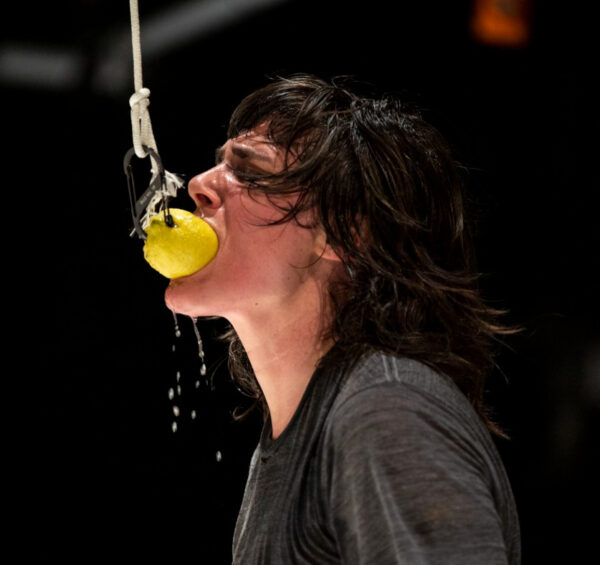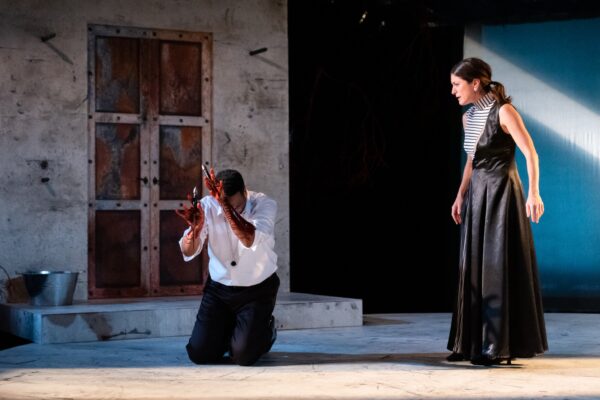Review: Mother Courage and Her Children by Bertolt Brecht. Adapted by David Hare. Produced by Seattle Shakespeare Company. Directed by Jeff Steitzer. With Jeanne Paulsen, Larry Paulsen, R. Hamilton Wright, Chesa Greene, Trick Dannecker, Spencer Hamp. Now through November 22, 2015 at the Center Theatre @ The Armory/Seattle Center.
Review: Festen by David Eldridge. Adapted from the film script by Thomas Vinterberg and Mogens Rukov. Produced by New Century Theatre Company. Directed by Wilson Milam. With Connor Toms, Bradford Farwell, Amy Thone, MJ Sieber, Betsy Schwartz, Emily Chisholm, Brenda Joyner, Ray Gonzalez, Michael Patten, Conner Neddersen, Peter Dylan O’Connor, Jason Sanford, Evan Whitfield. Now through November 21, 2015 at 12th Avenue Arts.
What do you do when you see two plays in a weekend that have some similar traits?
If you’re a theater critic, you combine BOTH shows into ONE review thus saving time and energy! It’s a very European thing to do…like both productions in question. On one hand, you have a mid-2oth century classic in Seattle Shakespeare Company’s currently running presentation of Bertolt Brecht’s Mother Courage and Her Children. And, then we have the slightly more modern charms of the Danish flavored, Festen, based on the 1998 film by Thomas Vinterberg and adapted for the stage by David Eldridge and produced by New Century Theatre Company. They’re both family dramas, of a sort, and both of them concern war. The family in the Brecht work, is IN the middle of the 30 Year War while the family at the heart of Festen is waging war on ITSELF. The outcome in both situations is equally tragic. Meanwhile, the journey we take in both of these productions, as an audience, is also equally mixed with results both positive and….not so positive.

Trick Danneker, Chesa Greene, Jeanne Paulsen, and Spencer Hamp in Mother Courage and Her Children. Photo by John Ulman.
We’ll begin with Seattle Shakes and their take on a Brechtian classic. Mother Courage is now arguably considered Brecht’s greatest work, written in the early days of World War II as Brecht himself fled from the onset of the Nazis moving across Europe before ultimately landing in America for the duration of the war. Written with considerable input from his secretary/muse/collaborator Margarete Steffin, the play parallels life in the war torn Europe of the late 1930s/40s with a very similar experience in Europe of the Thirty Year War circa 1624 to 1636 (the time frame of this play) when Protestants and Catholics raged war across north central Europe. Mother Courage is the nickname of the darkly humored main character, Anna Fierling, a tough as nails canteen owner who travels along the front lines of the war hoping to make a profit selling goods to whatever side is closest and has the money to pay her. Along the way, Mother Courage loses all three of her children to the grim realities of war, yet she perseveres and the conclusion of the play finds her grimly pulling her wagon by herself, trudging on to life’s inevitable conclusion but refusing to give in.
It’s still a powerful play, even after nearly 70 years, and when correctly directed and produced, can make for a powerful (yet entertaining) night of theater. Punctuated with Brechtian black humor as well as interludes of song, it shouldn’t be a dour theater experience. Brecht’s works, which also address serious themes, are highly theatrical and involving works; he wanted you to THINK but he also wanted you to EXPERIENCE the works theatrically while remaining slightly removed from it all. Brecht, when done correctly, should never be dull…it should actually be vibrant and vivid and powerful and crackling with energy.
Sadly, despite some good performances, Seattle Shakespeare Company’s production seldom achieves those goals. Instead of crackling with energy, it disappoints with a dry, academic tone and a total lack of directorial vision or scope. Jeff Steitzer’s direction is detached to the point of dreariness; there’s a decided lack of energy and pace to this production. The scenes just plod along without much focus or any sense of theatricality. A case in point is the presentation of the songs in Mother Courage which just sort of happen, suddenly and grimly without any apparent purpose or reason. Some would argue that was the intent of Brecht, but Brecht was also an astute director who knew how to approach material and present it logically within the context of the whole. That’s not happening here.
There are things to admire in this production. The actors are largely quite good with the standouts being the wife and husband duo of Jeanne Paulsen and Larry Paulsen who play Mother Courage and the Chaplain, respectively. Ms Paulsen is very committed to keeping the character as contained and detached as possible; it’s a very Brechtian performance and while she keeps Anna as unflinching as possible, she also superbly creates a very multi-layered characterization that minutely details all the emotions that can be expressed. I’d personally like to see the performance be a shade lighter; tonally it gets a trifle monotone at times which doesn’t help the pacing/energy problems with this production, but overall it’s a very compelling and subtly passionate performance.
Mr. Paulsen also delights as the vaguely roguish companion known simply as the Chaplain. He adds some much needed light and charm to the rather dour proceedings. R.Hamilton Wright is appropriately R. Hamilton Wright-ish as The Cook, another companion to Mother Courage who’d like to hook up with her on a more permanent basis. He’s waggish without being offensive about it.
Recent Cornish College graduate Chesa Greene was a chief highlight as the mute daughter Kattrin. Some consider such roles, (along with any character with a disability) as easy work for actors; I don’t. It’s tough to create a realistic portrayal that doesn’t teeter over into the abyss of the camp and the cloying. Ms Greene does a brilliant job of making Kattrin vividly real and emotionally powerful.
Despite some strong acting, I can’t quite recommend this Mother Courage. It’s dry, academic presentation leads much to be desired. Brecht’s plays need to be electric and powerful and relevant…not dioramas in the Great Theatrical Museum of Classic Works.

The cast of “Festen” — with Brenda Joyner, Ray Gonzalez, Bradford Farwell, Amy Thone, Evan Whitfield, Betsy Schwartz and Connor Toms. Photo: John Ulman.
Meanwhile, across town at 12th Avenue Arts, the crazy kids at New Century Theatre Company decided they wanted to do a BIG show about a big, European family and its dirty little secrets and cast pretty much every member of its current company in the production….regardless if they’re age appropriate or not.
Festen is a play based on a film by Danish director Thomas Vinterberg (written by Vinterberg and Mogens Rukov) and celebrated as being the first “Dogme 95” film. Dogme 95 was a film movement created by young Danish filmmakers Vinterberg and Lars von Trier which encouraged a purer process in crafting film.
From our good friends at Wikipedia:
“The goal of the Dogme collective is to purify filmmaking by refusing expensive and spectacular special effects, post-production modifications and other technical gimmicks. The filmmakers concentrate on the story and the actors’ performances. They believe this approach may better engage the audience, as they are not alienated or distracted by overproduction.
The film (which was released in the U.S. as The Celebration) was praised and won awards and rather quickly, thoughts turned to adapting it for the stage. The nature of Dogme 95 with it’s insistence on the action taking place in real time/real locations seemingly made it ideal for a theatrical adaptation. The plot is rather basic: the family, friends and flunkies of wealthy hotelier Helge gather to celebrate his 60th birthday. The only problem is, the family is fractured and eldest son Christian chooses this festive occasion to drop a bombshell at the banquet table: Dear old daddy Helge sexually molested Christian and his twin sister when they were children which years later, resulted in the subsequent suicide of the sister. But, the family refuses to believe Christian and sides with Helge while the staff of the hotel take a contrasting view and support Christian. Eventually, more secrets are revealed and more dirty linen is aired and things get increasingly hectic as the family wages war on itself.
Festen is a feast for any theater company. It has a huge cast (14) and a juicy plot but a simple-ish setting and a tight 90 minute run time. It’s an interesting dynamic work with a powerful plot but it also suffers a bit in the translation. The themes and relationships are decidedly European and specifically Scandinavian in tone; staff/flunkies/proletariat are supposed to be servile to the ruling class yet we’ve apparently moved the setting from Denmark to the US? (Despite keeping the Danish names of all the characters…) It’s a bit confusing and needlessly so. There’s also an odd detached air about the entire piece that never really coalesces into a satisfying whole; it feels a bit rushed. Meanwhile, some of the characters are rather crudely drawn. Christian’s younger brother Michael is an oafish, over the top bully while younger sister Helene is crudely vapid; both characterizations are a bit cartoony and not at all fully dimensional.
Due to the huge cast, melodramatic plot and brisk running time, we also don’t have time to actually develop any relationships with any of the characters. The problem in adapting a film into a play, is that a film can be edited and a lot of story can be told in quick cuts and multiple shots that draw attention to specific things, faces, moods and emotions. That’s not really doable with a play. Despite any empathy you might feel for Christian, it’s still hard to get too involved or attached to a character we barely know. Because of these and other issues, ultimately the text of Festen, fails as a piece of dramatic theater. It’s one thing not really succeeding at trying to pretend to being another.
Still…it does entertain. It’s easy to understand why New Century was drawn to the material. It’s a bloody soap opera with rich people in conflict with one another, and class warfare raging, and dirty secrets being aired in public. It’s a Danish “Dynasty” with more pedophilia and less emphasis on shoulder pads and women fighting in conveniently placed mud ponds. It’s also aided by Wilson Milam’s direction; he keeps the pathos nicely balanced with the anarchy and even manages to tidily wrap it all up, despite the rather limp writing in the play’s conclusion. It also doesn’t hurt that Festen is also lavishly designed with handsome sets, costumes, lighting and sound. It looks and sounds very lush.
As for the acting, we’ll get back to my cryptic snark in the opening paragraph. New Century has apparently been itching to do this play for quite awhile…it’s been in the planning for several years. But, that raises the question of casting a show that requires actors of relatively specific ages to play different generations. Festen requires 60 year old parents and a trio of under 35 year old actors to play their children. New Century has Bradford Farwell and Amy Thone who are barely 52 at best, as the old folks while the average age of their “kids” seems to be about 38. It sounds like quibbling, but it does mess up the dynamic a bit when Mom & Dad were apparently about 10 when they got married, and the two younger siblings in the cast appear to be about 5 years older than their “big” brother.
The acting itself, is fine with Mr. Farwell actually the most compelling and chilling as the patriarch, Helge. His big speech where he denounces/rejects his son, is terrifying and precise in its cruelty. Ms Thone seems to be enjoying herself as the vague mother…is she channeling Mary Tyrone just a bit in a bleary, drug clouded sort of way? Maybe…regardless, she’s fascinating as always.
As the kids, MJ Sieber is taxed with the hammy, over written delights/drudgeries of the loudmouth little brother Michael while Betsy Schwartz is the dingbat sister Helene. They both manage to overcome the cardboard cutout nature of their roles. Brenda Joyner manages to color Michael’s embattled wife Mette with some interesting character shades and nuances, while Jason Sanford injects some vitality into his last to arrive portrayal of Helene’s new boyfriend, Gbatokai, who’s not given much to do other than incite some racist comments from the rest of the gathering.
It’s really Big Brother Christian’s show and despite the fact he’s not given many facets to play other than repressed disgust, Connor Toms does a great job creating a vivid character out of the gloomy facade of the traumatized Christian. It’s mainly conveyed through his face and the silent but accusatory resignation he displays when confronted by the reality of the monstrous acts committed by his father.
Despite a script that veers around too much in cliche and clunky artifice, I’m going to recommend this Festen largely due to Mr. Milam’s energetic direction of a lively cast and the production’s overall strong production values. Festen is, at heart, a soap opera complete with scandal, romance, heartache and quite a bit of humor to balance out its essentially tragic story about a father’s betrayal. Its passionate theatricality isn’t very “Dogme” but it does make for some riveting hyper saturated theater.


















